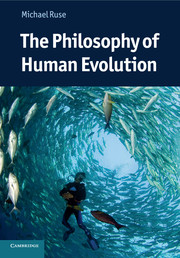6 - Morality
Published online by Cambridge University Press: 05 June 2012
Summary
“What should I do?” Let us turn now to the second of the great questions of philosophy. Does evolutionary theory, does Darwinian evolutionary theory, throw any light on this topic? Many people today think that it does, but how far the light actually penetrates is still a matter of great controversy. As with the problem of knowledge, it makes most sense to go back and start with Charles Darwin himself.
Darwin on morality
Thanks to an extended discussion in the Descent of Man, Darwin had far more to say on the topic of morality and behavior than he had had to say on knowledge and its foundations. Moreover, his thinking on the issues takes us right to the heart of one of the most contested issues in contemporary evolutionary theory. But start as before with the fact that, although knowledgeable, Darwin was not a philosopher with a philosopher’s questions. He was a scientist with a scientist’s questions, and philosophy would be tackled (if at all) only tangentially. We see this at once in Darwin’s treatment of morality. Philosophers distinguish between two major issues that must be addressed when dealing with moral thought and behavior. What should I do? Why should I do what I should do? These two branches of the subject are usually referred to as “normative (or substantive) ethics” and “metaethics,” the first to do with directions and the second with foundations. By way of example in Christian ethics one finds normative questions along the lines of “Love your neighbor as yourself,” and generally a metaethical answer in terms of God’s will, “You should do that which God wants.” Of course giving answers is only the beginning of inquiry. Who is one’s neighbor? Why should one obey God? But this is as it may be. I am using Christianity as an example of how it all works, not as solution which should (or should not) be accepted.
- Type
- Chapter
- Information
- The Philosophy of Human Evolution , pp. 155 - 184Publisher: Cambridge University PressPrint publication year: 2012



